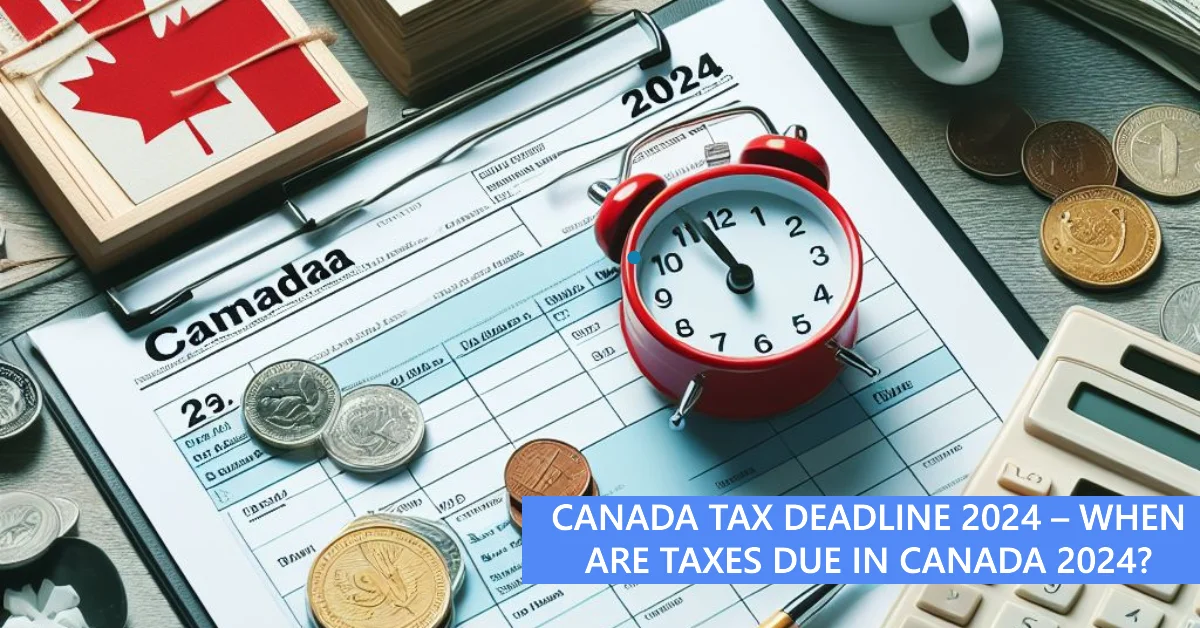For Advertising Contact Us
Canada Tax Deadline 2024 – When Are Taxes Due in Canada 2024?

Tax season is upon us, and it is crucial for Canadians to stay informed about the upcoming deadlines to avoid penalties. Knowing when your taxes are due is vital to ensure a smooth and stress-free process. Whether you are a seasoned taxpayer or new to the game, understanding the important dates can save you from unnecessary headaches. Stay ahead of the game and mark your calendars to meet the Canada Tax Deadline for 2024.
Types of Taxes in Canada
For Canadians, understanding the various types of taxes they are subject to is crucial for proper financial planning. Here is a breakdown of the major types of taxes in Canada:
| Personal Income Tax | Corporate Income Tax |
| Goods and Services Tax (GST)/Harmonized Sales Tax (HST) | Provincial and Territorial Taxes |
Personal Income Tax
Taxes in Canada are levied at the federal and provincial/territorial levels. Personal income tax is based on an individual’s total income earned throughout the year, with tax rates varying based on income brackets. Assume that individuals are required to file their tax returns by the deadline to avoid any penalties.
Corporate Income Tax
Little is known about corporate income tax in Canada. Corporations are subject to federal and provincial/territorial taxes on their income. The tax rates are different for small businesses and large corporations. Types of deductions and credits are available to corporations to reduce their tax liabilities.
Goods and Services Tax (GST)/Harmonized Sales Tax (HST)
Services in Canada are subject to a federal Goods and Services Tax (GST) and some provinces have adopted the Harmonized Sales Tax (HST) which combines the federal GST with provincial taxes. The GST/HST is a value-added tax that is charged on most goods and services sold in Canada.
Provincial and Territorial Taxes
Corporate entities operating in Canada are also subject to provincial and territorial taxes in addition to federal taxes. Each province and territory sets its own tax rates and rules, leading to variations in tax obligations across the country. With careful planning, businesses can optimize their tax liabilities at both the federal and provincial/territorial levels.
Key Dates for the 2024 Tax Season
Individual Income Tax Deadline
Not meeting the deadline for filing your individual income tax return can result in penalties and interest charges.
Corporate Income Tax Deadline
Deadline for corporate income tax returns is crucial for businesses to avoid any financial repercussions.
Deadline: Corporations in Canada need to file their income tax returns within six months after the end of their fiscal year.
Special Circumstances and Extensions
An understanding of special circumstances and extension options can help taxpayers navigate unexpected situations.
Another important point to consider is that filing for an extension does not exempt you from paying any taxes owed by the original deadline.
Step-by-Step Guide to Filing Your Taxes
Gathering Necessary Documentation
Little preparation goes a long way when it comes to filing your taxes. Make sure to gather all necessary documents such as T4 slips, receipts, and any other relevant paperwork to ensure a smooth filing process.
Completing Your Tax Return
Assuming you have all your documents in order, completing
completing your tax return is the next step. Be sure to fill out all sections accurately and double-check your information before submission.
Gathering all your paperwork and understanding your tax
situations can help streamline the process. Ensure you have reported all
income sources and claimed all eligible deductions to maximize your refund.
Submitting Your Tax Return Online or by Mail
Guide yourself through the process of submitting your tax
return online or by mail. Choose the method that works best for you and
follow the instructions carefully to avoid any delays in processing.
To ensure timely processing, it is important to submit your
tax return before the deadline. Double-check all information and
documentation to avoid any errors that could delay your refund or result in
penalties.
Handling Payments or Refunds
Mail your payment to the Canada Revenue Agency if you owe taxes,
making sure to include your social insurance number and tax year on the
cheque. For refunds, ensure your bank account information is up to date to
receive your money promptly.
Refunds are typically processed within a few weeks if you file
electronically. Recall, timely filing and accurate information can
benefit you with a quick refund and avoid any potential penalties.
Tips for a Smooth Tax Filing Experience
Many Canadians find tax season to be a stressful time of year, but with the right approach, filing your taxes can be a straightforward and smooth process. By following these tips, you can make your tax filing experience efficient and hassle-free.
Organizing Your Financial Records
Any successful tax filing process starts with organizing your financial records. Make sure you have all necessary documents, such as income statements, receipts, and investment information, in one place. This will help you easily access the information needed to complete your tax return accurately and on time.
Utilizing Tax Software and Professional Help
Utilizing tax software or seeking professional help can streamline the tax filing process and ensure accuracy. Help from professionals or using software like QuickBooks can help you maximize deductions and credits, potentially saving you money in the long run. Plus, they can provide valuable insights and guidance on complex tax matters.
Staying Informed About Tax Changes and Deductions
One key tip for a smooth tax filing experience is staying informed about any tax changes and deductions that may impact your return. Keeping up to date with the latest tax laws and regulations can help you take advantage of any new deductions or credits that could benefit you. Bear in mind, knowledge is power when it comes to taxes.
Factors Affecting Your Tax Situation
Employment Status
Factors related to employment status can significantly impact your tax situation. Whether you are an employee, self-employed, or a contractor can determine the type of deductions you are eligible for and how you report your income. The classification of your employment status plays a crucial role in determining your tax liabilities and entitlements.
Investment and Other Types of Income
To effectively manage your investment and other types of income, it’s crucial to understand the tax implications associated with each source. Different types of income like rental properties, dividends, and capital gains are subject to varying tax rates and regulations. Knowing how each type of income is taxed can help you optimize your tax strategy and minimize your tax obligations.
| You | With a thorough understanding of investment and other types of income, you can make informed decisions to maximize your tax efficiency and compliance. |
Life Events and Their Tax Implications
Employment changes, marriage, having children, or buying a home can have profound tax implications. These life events can trigger changes in your tax situation, such as eligibility for new credits or deductions. It is vital to stay informed about how these events may impact your taxes to avoid surprises at tax time.
Provincial or Territorial Variations
Your provincial or territorial location can significantly influence your tax situation. Each province has its own tax rates, credits, and deductions, which can affect the amount of tax you owe. Understanding the specific tax rules in your province or territory is crucial for accurate tax planning and compliance. Territorial tax variations can impact your overall tax liability, so it’s important to be aware of the differences in tax regulations.
Pros and Cons of Early vs. Late Tax Filing
| Advantages | Possible Disadvantages |
| Faster refund processing | Potential for missing out on deductions or credits |
| Reduced stress and anxiety | Less time to gather all necessary documents |
| Less chance of identity theft | Potential for errors due to rushing through the process |
Advantages of Filing Early
Advantages of filing your taxes early include faster processing of your refund, reduced stress and anxiety, and a lower risk of identity theft. You can also have peace of mind knowing that your taxes are taken care of well before the deadline.
Possible Disadvantages of Filing Early
Cons of filing early may include missing out on potential deductions or credits that could lower your tax bill. Additionally, rushing to file early may lead to errors in your return if you do not have adequate time to gather all necessary documents.
Consequences of Filing Late
Even though filing your taxes late is better than not filing at all, there are consequences. These can include late filing penalties, interest on any outstanding tax amounts, and potential audits from the Canada Revenue Agency.
When Late Filing Makes Sense
Early filing may not be possible for everyone. If you are missing crucial documents or going through a major life event like a move or a job change, it may make more sense for you to file your taxes late. However, make sure to file as soon as possible to minimize any penalties or interest.
To wrap up
As a reminder, the tax deadline for Canadians in 2024 is April 30th. It is crucial to ensure that your taxes are filed accurately and on time to avoid any penalties or complications. Remember to gather all necessary documents, stay informed about any changes in tax laws, and consider seeking professional help if needed. By staying organized and proactive, you can meet the tax deadline with confidence and ensure a smooth tax filing process in Canada for the year 2024.



